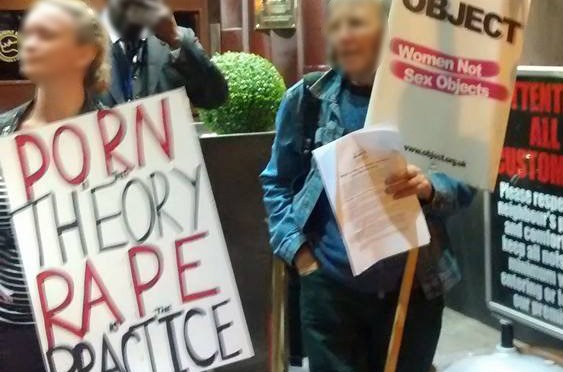This is an open letter to Roz Hardie, CEO of the campaign group Object.
Dear Roz,
It was good to meet you on London Live TV last Wednesday, if only briefly, where we discussed this past weekend’s XBIZ EU conference for the adult industry. It was an extra, unexpected pleasure to see you in the Hilton prior to your anti-porn protest on Thursday, and again at your protest outside the Spearmint Rhino strip club on Saturday.
Although we don’t seem to agree on much (you think all expressions of sexuality are evil, I don’t, etc.), I’m contacting you to suggest an alliance in one area where we seem to agree, and where we can work together against one of the great scourges of society: rape.
You see, in all the years I’ve been following Object, I’ve noticed your frequent claims that women in the sex entertainment industries are being raped as a matter of routine. When I debated against your colleague Julia Long at UCL some years ago, she claimed to know of cases where women had been abused on porn sets – although she declined to provide any detail.
You made similar points about sexual coercion in pornography during our TV appearance last week, but again provided no detail. It seems this behaviour isn’t new; the veteran anti-sex campaigner Mary Whitehouse claimed to be in possession of letters from victims of the porn industry, although oddly, she chose not to share these with the authorities.
Object seem to have one core tactic: to shout “rape” in the context of pornography and other sexual entertainment. At one protest I witnessed outside an Internet porn conference, your supporters were shouting about the mass rape in the Democratic Republic of Congo, which took place during its long and brutal war; although it remained a mystery to me as to how Internet porn could be held responsible for this, in a country with few roads, let alone broadband connections.
At your protest last Saturday, your supporters were screaming “rapist” at men walking into Spearmint Rhino. There were also women going into the club, and curiously your people called them “losers”. I would have expected that, if you believed women were being raped in Spearmint Rhino, you would be extending an arm of support to them, rather than screaming childish insults.
It has long troubled me that Object are prepared to make endless claims of rape and sexual abuse against the sex entertainment industries; and yet, to my knowledge, you have filed no police reports. Nobody has been arrested or taken to court. Shouldn’t rapists face the full might of the law? As we know, rape convictions are difficult to get, because it often comes down to one person’s word against another. But you’re claiming that industrial-scale rape is taking place ON VIDEO! Surely, convictions will be easy in these cases?
So here’s my proposal: if, as you have long claimed, Object have evidence of sexual violence associated with the sexual entertainment industries, then let’s approach the police with it. I will help you identify the publishers, producers and performers involved. We recently discovered that we both live in the same London borough – shall we fix a date to meet at Lewisham police station?
As a “feminist human rights organisation”, I’ve no doubt you will leap at the chance of bringing rapists to the attention of the law. If, on the other hand, you are merely using rape accusations as a tool of panic in order to further moralistic, pro-censorship aims, then you are taking the fight against sexual violence backward rather than forward. By labelling random men as rapists, and by referring to consenting sex between adults as rape, you are redefining the concepts of rape and consent to suit a conservative, anti-sex agenda. By harassing women who work in the sex industries, while telling the media that you are “saving” them, you divert attention away from sexual violence and towards the stigmatisation of healthy, adult sexual expression.
A female business owner who witnessed your behaviour on Saturday wrote the following to me:
Object’s attitude towards anyone, whether they are remotely affiliated to the adult industry or directly involved in it is absolutely disgusting. A couple of guys were horrified when they arrived as they had the term ‘Rapist’ shouted at them. It is irresponsible to use such terms so candidly when a number of women and some men even have been subjected to such horrible crime. It is dangerous and potentially damaging to society when people start using such labels so lightly. Most will agree that this is not a rational way of putting across any sort of argument, this is quite simply verbal abuse because our ideals of sexual freedom and freedom of speech are not line with theirs.
I look forward to hearing from you, and helping you ensure that the violent criminals you regularly invoke are brought to justice.
Sincerely,
Jerry Barnett
Founder, Sex & Censorship

